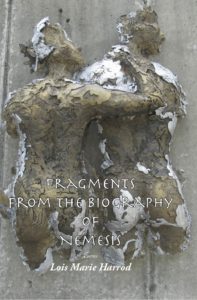 Review by Ann E. Michael
Review by Ann E. Michael
– Poetry books offer the opportunity to travel, vicariously, to new environments. They also muster the reader out of her own perspective through the poet’s various chosen arts: syntax, imagery, rhythm, vocabulary, metaphor, and so on. Lois Marie Harrod’s latest collection cues the reader into the physical places the poems conjure, from Ringos New Jersey to the Great Barrier Reef; yet it strikes me that her work in this book deals less with regions and geographies than it does with internal places such as imagination and inter- and intrapersonal relationships.
Harrod masters the strategy of turning description into action, creating the mind’s-eye picture for the reader. She often supplies observant moments such as this one, when the “you” in the poem spies two deer and “your dog lumbers after/ like a song off key,/ and they lift across the weeds,/ lucid arpeggios/ like wild corn,/ like wild grasshoppers/ confusing the birds.” The place here is Hopewell, NJ (“Catching the Deer”) and the diction is casually familiar, but the poem takes us into the experience imaginatively. The piece closes with the kind of visual that seals the internal aspects of Harrod’s work, the dog “pointing towards/ what he cannot catch.”
What we cannot catch, we may covet—or dream about, or let go of and forget. Such options, human choices, Harrod examines with a pragmatic and inquiring mind. In such poems as “We Stay Most When We Stay Not at All,” “The Binoculars,” and “Now I Want You Softly,” she writes perceptively about mature love and its quirky expectedness and changes:
It’s the way we often are, uncertain of the right thing to do.
Noli me tangere. By now we had finished our sandwiches…
It’s the ordinary detail of finishing the sandwiches that carries the couple through their mild disagreement and primes the reader for the poem’s charming little revelation at the end. The humor helps, too, and if you want something to cheer you up on a gloomy day, you could do worse than reading Harrod’s poems on the sex lives of truffles and dinosaurs.
On a more somber note, Harrod also questions why love comes undone; the motherly grief the speaker expresses in “Sea of Appearances” will ring true to any reader who knows the “second-hand” sorrow of being unable to cure a loved one’s heartbreak. In personification poems, such as “The Litany of Fog” and “The Litany of the Mussel Shell,” she makes physical objects manifest as women, and the tone feels authentic, the personification unforced.
Many of Harrod’s poems are simply a pleasure to read—even before the reader stops to think about meaning—because she often uses alliteration as rhythm and she clearly has an ear for resonant vowel sounds, as well. The poems often possess a deceptive calm, deepening into the knotty questions human beings confront daily, while remaining beautiful to peruse. Her mode is lyrical and more speculative than reflective. When memory intercedes—as of course it must—it leads to discoveries and possibilities rather than stopping at narration or leaving off with nostalgia or regret. Her own phrase describes her work best, I think: “the soft clay of experience and its sharp stylus.” We are lucky to have those tablets in the form of this fine collection.
Fragments from the Biography of Nemesis
by Lois Marie Harrod
Cherry Grove Collections, 2013
ISBN 978-1625490094, 122 pages, $20.00
Ann E. Michael’s latest collection of poetry is Water-Rites (Brick Road Poetry Press). She is writing coordinator at DeSales University in Center Valley PA. Her essays, reviews, and poetry have appeared online and in print since the 1980s. She blogs on poetry, philosophy, education and nature at www.annemichael.wordpress.com.
